The Bible Core and the New Curriculum at Calvin Theological Seminary

Published by Wilson Cunha
Professor of Old Testament; Co-Director of the Master of Theology (ThM) Program
In the fall of 2022, Calvin Theological Seminary rolled out its new curriculum, centering on four primary learning outcomes: gospel, person, context, and calling. We hope to “provide tools that will deepen the student’s understanding of the biblical gospel, nurture the pastoral identity of the person, foster skills for engaging in contextual and constructive theological reflection and application, with the calling of equipping students for the work of ministry.” Each course we offer at CTS devises learning goals for all four of our general learning outcomes, irrespective of a course’s primary theological area. These four pillars highlight the long-standing integrative approach of theological education that has been a unique feature of CTS for years.
Here I want to call attention to the “Bible core,” which more deliberately aims at helping students understand the “gospel.” The “Bible core” comprises four required Bible courses: two twin courses called “the Mission of God in the Old Testament” and “the Mission of God in the New Testament” approach the Bible as a unified narrative that witnesses to God’s mission in the world. The “Mission of God” courses, rooted in the Reformed tradition, emphasize a single redemptive history across two testaments. They also study primary theological themes as they develop in the Old and the New. The biblical narrative’s unity, not fragmentation, is the emphasis of these two core courses. They also touch on Christian vocation and identity formation and on providing a biblical theological foundation for ministry.
More particularly, “The Mission of God in the Old Testament” studies the Old Testament from a larger picture perspective. First, it helps students develop a firm grasp of the OT’s larger narrative framework. Because we often learn the OT and the NT following its main canonical sections, students may leave seminary with a good grasp of the parts but a poor understanding of= the whole. Contrarily, students should understand how the OT works together and appreciate its larger narrative structure. We believe seminary training should work against a fragmented view of the OT, and “the Mission of God in the OT” seeks to do just that. Second, students should understand the OT as a theological witness to God’s mission in the world. A feature of modern Biblical studies is to focus on literary and historical issues, especially historical background material to the OT. These studies have produced tremendous insight into our understanding of the OT’s message. However, there is a danger of getting lost in historical reconstructions and losing sight of the OT’s higher- level message about God’s ways in the world. Therefore, students should learn to parse the OT’s theological message regarding the mission Dei and God’s call for participation in his mission. And third, students should get acquainted with the OT’s eschatological view. Here the Wisdom Literature and the Prophets are essential. They portray the vindication of the righteous, the wicked’s demise, and God’s renewal of his creation (see, e.g., Psa 1:6; 37; 73; Isa 11:1–10; 65–66). Such a message encourages Christians living in uncertain times when evil seems to have the upper hand and the wicked seems to prosper. In this respect, OT eschatology encourages nurturing a waiting community that longs for the decisive arrival of God’s kingdom.
In addition to the “Mission of God” courses, CTS also requires students to take “Interpreting the Old Testament” and “Interpreting the New Testament.” These core courses allow for a deeper engagement with a canonical section or significant theme in the Scriptures. Encountering God in the pages of Scripture is a profoundly transformative and formative experience that requires careful listening. One scholar said it well: “Between the horizon of the text and that of the reader, a creative tension develops which calls for the affirmation of the status quo or for the openness and courage to accept a new self–understanding.” As such, the primary goal of the “Interpreting” courses is to help students develop hermeneutical skills to carefully listen to God’s voice, not to silence it with preconceived beliefs. Thus, the four Bible courses in the new curriculum hope to help students understand the gospel message, especially its deep roots in the Scriptures of the Old Testament.
For students looking for an even richer engagement with the Scriptures, the new curriculum offers four courses on Biblical languages. Biblical Hebrew I and II cover the entire Hebrew grammar. Students reach a milestone when they read all of Jonah in Hebrew. The course reviews significant aspects of Hebrew grammar and syntax while introducing students to Hebrew exegesis. Greek I and II cover the entire Greek grammar while offering interpretive nuggets throughout. These language courses provide students with lifelong skills to read the Scriptures well. As an alternative, not an equivalent, the new curriculum offers one semester each of “Hebrew tools” and “Greek tools.” These courses do not intend to give students Hebrew or Greek knowledge. They instead focus on understanding the most rudimentary features of each language (e.g., the alphabet and some representative vocabulary) to facilitate using printed and electronic tools (e.g., commentaries, dictionaries, Accordance, Logos Bible Software).
In curricular conversations at a confessional institution like CTS, it is essential to remember that “curriculum development” is only part of the equation. The other is the work of the Holy Spirit in calling, equipping, and guiding (John 14:26). Would you please consider making CTS a regular item in your personal and congregational prayers? Pray that the Holy Spirit will breathe life into all our teaching efforts. Curriculum reflection and planning aside, we ultimately depend on the life- giving work of the Holy Spirit.
Share
Visit Calvin Theological Seminary’s Campus
We can’t wait to host you on campus! Schedule your visit today, or, if you need more time to find a date that works for you, please request information so we can continue the conversation about supporting your calling!
